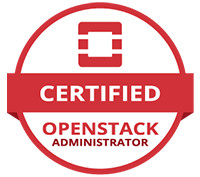Cleura Cloud Academy
OpenStack API and CLI Fundamentals
Our OpenStack API training course is a self-paced introductory course for fundamental OpenStack client knowledge. It will enable you to deeply understand the basic ideas behind OpenStack and the general structure of the platform. All Cleura Cloud Academy courses offer tailor-made courseware and sophisticated labs to give learners highly relevant and practical open source cloud training.
- OpenStack Compute
- OpenStack Object Storage
- OpenStack Networking
- OpenStack Identity
- OpenStack Block Storage
| Location | Starts | Ends | Duration | |
|---|---|---|---|---|
| Online Only | Ongoing | Ongoing | Register |
OpenStack Deployment and Operations
OpenStack Deployment and Operations is our self-paced introductory course for fundamental OpenStack knowledge. It is the base for all our other OpenStack training modules that we offer and will enable you to deeply understand the basic ideas behind OpenStack and the general structure of the platform. All Cleura Cloud Academy courses offer tailor-made courseware and sophisticated labs to offer highly relevant and practical open source cloud training.
- OpenStack Compute
- OpenStack Object Storage
- OpenStack Networking
- OpenStack Identity
| Location | Starts | Ends | Duration | |
|---|---|---|---|---|
| Online Only | Ongoing | Ongoing | Register |
Advanced OpenStack Orchestration
A technical deep-dive into OpenStack Heat (Orchestration) for both operators and users of OpenStack private and public clouds. To be able to benefit fully from this course, we recommend taking either our OpenStack fundamental training course, or our OpenStack API course. All Cleura Cloud Academy courses offer tailor-made courseware and sophisticated labs to offer highly relevant and practical open source cloud training.
- OpenStack Orchestration
| Location | Starts | Ends | Duration | |
|---|---|---|---|---|
| Online Only | Ongoing | Ongoing | Register |
Ceph Distributed Storage Fundamentals
The Ceph Distributed Storage Fundamentals module is our technical deep dive into the Ceph distributed storage platform. This course is designed to provide an in-depth understanding of Ceph's architecture, design, and implementation. All Cleura Cloud Academy courses offer tailor-made courseware and sophisticated labs to offer highly relevant and practical open source cloud training.
- OpenStack Object Storage
| Location | Starts | Ends | Duration | |
|---|---|---|---|---|
| Online Only | Ongoing | Ongoing | Register |
Practical Kubernetes with OpenStack Magnum
A self-paced course covering fundamental OpenStack Magnum knowledge. It enables you to deeply understand the basic ideas behind OpenStack Magnum and the general structure of the solution. Each topic includes lab exercises, where you will have the opportunity to apply your knowledge in a fully-featured distributed environment.
| Location | Starts | Ends | Duration | |
|---|---|---|---|---|
| Online Only | Ongoing | Ongoing | Register |
Cloud Orchestration with Terraform
Get practical Terraform training and learn configurations, providers, and backends and learn how to orchestrate and provision containers in an Infrastructure-as-a-Service (IaaS) environment. All Cleura Cloud Academy courses offer tailor-made courseware and sophisticated labs to offer highly relevant and practical open source cloud training.
- OpenStack Object Storage
- OpenStack Orchestration
| Location | Starts | Ends | Duration | |
|---|---|---|---|---|
| Online Only | Ongoing | Ongoing | Register |

